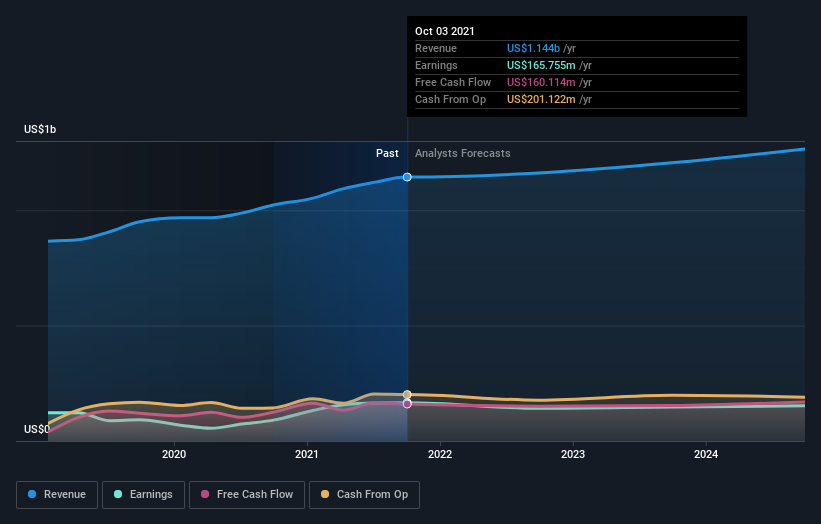Earnings growth of 86% over 1 year hasn't been enough to translate into positive returns for Jack in the Box (NASDAQ:JACK) shareholders
The simplest way to benefit from a rising market is to buy an index fund. When you buy individual stocks, you can make higher profits, but you also face the risk of under-performance. For example, the Jack in the Box Inc. (NASDAQ:JACK) share price is down 15% in the last year. That's well below the market decline of 1.4%. Longer term investors have fared much better, since the share price is up 7.7% in three years.
After losing 4.5% this past week, it's worth investigating the company's fundamentals to see what we can infer from past performance.
See our latest analysis for Jack in the Box
While markets are a powerful pricing mechanism, share prices reflect investor sentiment, not just underlying business performance. One way to examine how market sentiment has changed over time is to look at the interaction between a company's share price and its earnings per share (EPS).
During the unfortunate twelve months during which the Jack in the Box share price fell, it actually saw its earnings per share (EPS) improve by 86%. It's quite possible that growth expectations may have been unreasonable in the past.
It's surprising to see the share price fall so much, despite the improved EPS. But we might find some different metrics explain the share price movements better.
Jack in the Box's revenue is actually up 12% over the last year. Since we can't easily explain the share price movement based on these metrics, it might be worth considering how market sentiment has changed towards the stock.
The graphic below depicts how earnings and revenue have changed over time (unveil the exact values by clicking on the image).
Jack in the Box is well known by investors, and plenty of clever analysts have tried to predict the future profit levels. If you are thinking of buying or selling Jack in the Box stock, you should check out this free report showing analyst consensus estimates for future profits.
A Different Perspective
While the broader market lost about 1.4% in the twelve months, Jack in the Box shareholders did even worse, losing 13% (even including dividends). However, it could simply be that the share price has been impacted by broader market jitters. It might be worth keeping an eye on the fundamentals, in case there's a good opportunity. Regrettably, last year's performance caps off a bad run, with the shareholders facing a total loss of 0.2% per year over five years. We realise that Baron Rothschild has said investors should "buy when there is blood on the streets", but we caution that investors should first be sure they are buying a high quality business. I find it very interesting to look at share price over the long term as a proxy for business performance. But to truly gain insight, we need to consider other information, too. Like risks, for instance. Every company has them, and we've spotted 3 warning signs for Jack in the Box (of which 2 are potentially serious!) you should know about.
If you are like me, then you will not want to miss this free list of growing companies that insiders are buying.
Please note, the market returns quoted in this article reflect the market weighted average returns of stocks that currently trade on US exchanges.
Have feedback on this article? Concerned about the content? Get in touch with us directly. Alternatively, email editorial-team (at) simplywallst.com.
This article by Simply Wall St is general in nature. We provide commentary based on historical data and analyst forecasts only using an unbiased methodology and our articles are not intended to be financial advice. It does not constitute a recommendation to buy or sell any stock, and does not take account of your objectives, or your financial situation. We aim to bring you long-term focused analysis driven by fundamental data. Note that our analysis may not factor in the latest price-sensitive company announcements or qualitative material. Simply Wall St has no position in any stocks mentioned.

